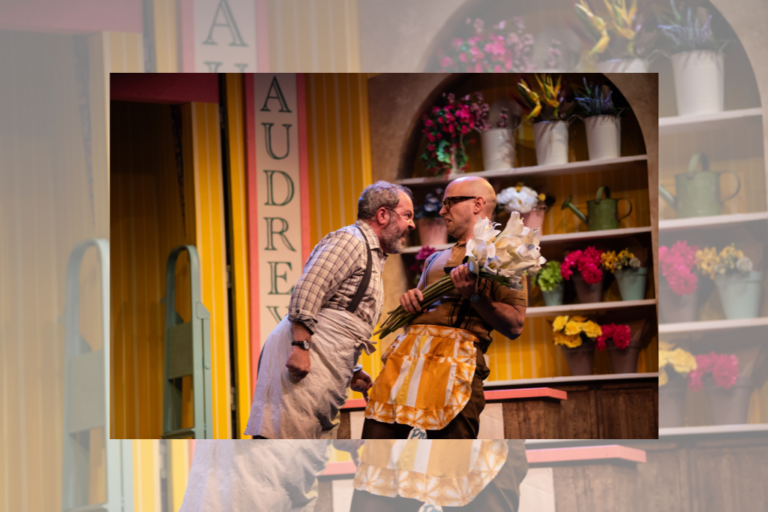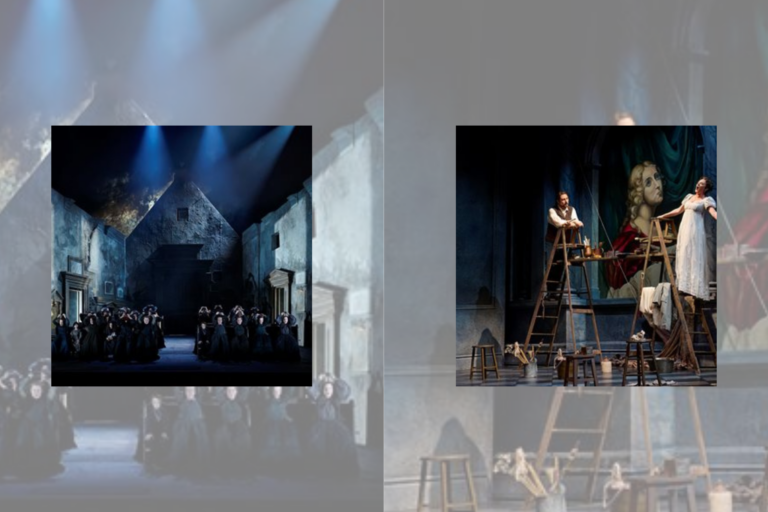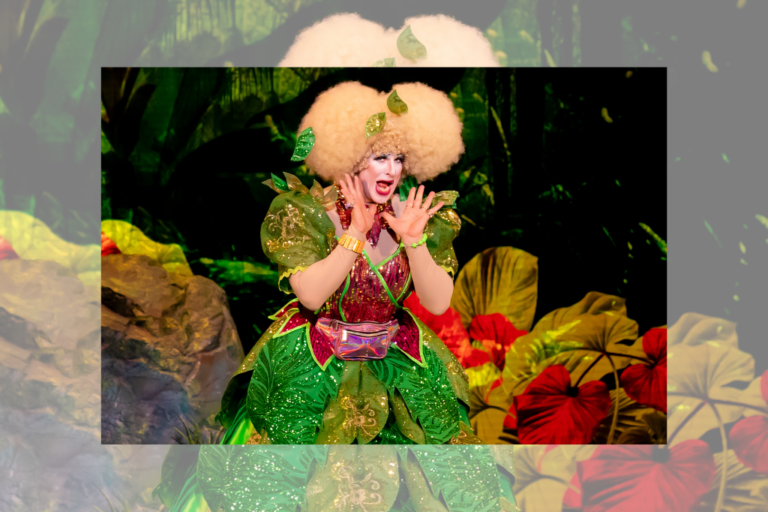REVIEW: A new take on Don Pasquale re-imagines its lead as a cat-loving crank
If you love cats, you’ll like Barbe & Doucet’s production of Don Pasquale.
The opera is already a delightful romantic comedy without any creative alterations by the directors, but with Barbe & Doucet’s dramaturgical addition of a cat motif, the Scottish Opera production of Don Pasquale, now onstage at the Four Seasons Centre as part of the Canadian Opera Company season, is even more ridiculous and fun. Barbe & Doucet’s directorial enhancement, which transforms the titular character into a cat-obsessed curmudgeon, provides plenty of comic flair in the opera composed by Gaetano Donizetti with libretto by Donizetti and Giovanni Ruffini. So much so that you should secure tickets right meow.
The action of Donizetti’s opera buffa begins after Ernesto refuses to marry the woman his uncle, Don Pasquale, has chosen for him, because he is in love with Norina. The audience joins the story when Don Pasquale decides to marry, despite his old age, which prompts his doctor, Dr. Malatesta, to hatch a scheme. The doctor plans to disguise Norina as the cat-like Sofronia, Pasquale’s bride-to-be, who at first, is a meek, gentle kitten (aligned with Barbe & Doucet’s production concept) but then becomes a tigress, abandoning the façade of submission, humility, and purity, after they take their vows.
Sofronia, under the guidance of Malatesta, arranges for a romantic rendezvous in the garden with a lover, which further infuriates Pasquale. This lover doesn’t exist; he is only an element of Malatesta’s scheme to make Pasquale’s marriage a nightmare. When Pasquale tries to catch his new bride with another man, Ernesto appears in the garden to declare he will marry Norina despite his uncle’s objection and Sofronia declares that she will not live under the same roof with another woman. Pasquale takes this opportunity to end his marriage with Sofronia. Now that Don Pasquale has experienced the horrors of a bad marriage, Dr. Malatesta reveals the bride’s identity, exposing his scheme. Pasquale accepts that he should celebrate that his nephew has found true love and allows him to marry Norina.
Pasquale as a cat-obsessed recluse is a clever, appropriate, and impeccably integrated dramaturgical detail from Barbe & Doucet. As a multi-hyphenate team who have directed, dramaturged, choreographed, and even designed costumes and sets for over 40 operas since joining forces in 2000, the duo has plenty of experience weaving all aspects of production into a cohesive tapestry. This choice, along with setting the opera in a pensione (or guest house) owned and poorly operated by the titular Don Pasquale in mid-’60s Rome, offers audiences a fresh, delightful, often silly, and entertaining opera experience.
Barbe & Doucet’s set features a reception and living room of the pensione center stage, flanked on one side by a stairway that leads to a quaint rooftop restaurant above. Laundry hangs on either side of the main structure and three clotheslines hang in the centre, initially hiding the second level from view. Even though Pasquale’s guest house is drab and dusty, Barbe & Doucet pepper it with neon green cat figurines that Pasquale uses to fill the void left behind by his flesh-and-blood beloved felines.
After Sofronia becomes Pasquale’s wife, she redecorates, replacing the cats and rundown furnishings with a pair of futurist white chairs, a minimalist white circular coffee table, a tall lamp, and black and white optical pop art, typical of Mid-century Modern style. The contrast between old, bland furniture and the bright, white, modern style highlights how much Sofronia disrupts Pasquale’s comfortable life.
In addition to the comic dramaturgical and design elements, the casting provides several opportunities for humour. Don Pasquale, played by Mishi Kiria, is a towering oaf, in contrast to Norina, played by Simone Osborne, who is comparatively petite. Osborne as Sofronia elicits laughter as she orders her new husband to obey, despite her diminutive size and his imposing presence.
Unfortunately, the voices of Osborne and Santiago Ballerini as Ernesto are similarly small at times. Especially in contrast to Kiria’s full, booming baritone, Osborne and Ballerini don’t always fill the hall with the vocal flair of Donizetti’s score. They do have their moments — their duet in the final act when they declare their love, for instance — but they are not consistently strong throughout.
The trio of pensione staff — an alcoholic cook, a chain-smoking cleaner, and a shrunken old bellhop, not credited specifically in the program — are consistently hilarious throughout the opera. After the first scene, the cleaner walks onstage with a heavy rope hanging from the fly, which she pulls with concerted effort to reveal the rooftop patio restaurant hiding just behind the clothesline. The bellhop shuffles at a laughably slow place in pants that have gathered in folds from his feet to below his knees and a jacket that has become far too big for him, suggesting that he is so old he has shrunk in his uniform.
Don Pasquale is an expertly directed and designed production performed by capable singers, who in turn are supported by a trio of clowns who provide laughs beyond the romantic plot. Directorial changes and additions to hits from the opera repertoire can often feel forced, confusing, or unnecessary. As a team, Barbe & Doucet have found dramaturgical elements that seem so well-suited to Don Pasquale, that if I didn’t know any better, I would have thought that Donizetti and Ruffini had come up with them themselves.
Don Pasquale runs at the Four Seasons Centre until May 18. Tickets are available here.
Intermission reviews are independent and unrelated to Intermission’s partnered content. Learn more about Intermission’s partnership model here.















One factor that may have influenced Osborne and Ballerini’s volume and voice colour is the stage clothes lines that were lowered at times. When these singers sang in front of the clothes there was an acoustical dampening effect from the heavy use of cloths that occupied much of the stage. The voice colour and volume were noticeably better when the clothe lines were raised and off the stage.
I really think you had a bad day or your competence is not right or worse – you are biased on some reason. Ballerini’s voice is amazing. He sings beautifully and absolutely effortless. I wish I didn’t read your review at all, but I’ll try to remember your name to avoid your articles in future.